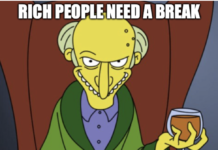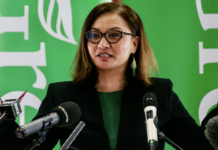
Edmund Burke once described society as a “contract between three interested parties, the living, the dead and the unborn.” I was reminded of this during the recent debate on the sale of Auckland Council’s airport shares. Auckland International Airport was built at Mangere in the early 1960s by Auckland local authorities and the government. It was opened in January 1966 by prime minister Keith Holyoake amidst much fanfare and Auckland civic pride. Managed by the Auckland Regional Authority it quickly became the busiest airport in the country and soon Oceania.
As part of the rogernomics reforms of the 1980s, the airport was corporatized, the shares split between the government and Auckland local bodies. Soon after, Papakura District in a controversial move sold its tiny parcel of shares to the government thereby giving the government majority ownership. In 1998 the Shipley government used this to privatise to list the company and privatise the government’s shares. North Shore City sold its shares the following year. In 2002, Auckland City’s newly elected mayor John Banks in his first budget proposed to sell all Auckland City’s shares but in the face of widespread opposition, eventually sold half. In response Manukau City under Sir Barry Curtis increased its holding to block a takeover by a foreign interest, which I understand to have been Dubai World (which is also long been interested in buying the Ports of Auckland). The remaining shares, some 22% along with the Ports of Auckland were gifted to the new ‘Super City’ in 2010. This portfolio shrunk relatively to 18.9% over the past 13 years as the Council declined to take up reissued share offerings.
This was the situation when soon after his election Mayor Wayne Brown announced his intention to sell all the shares. In a case of ‘history repeats’, last month, just as in 2002, the council voted to sell just under half its remaining portfolio.
Councillors Lotu Fuli, Alf Filipaiana, Angela Dalton, Josephine Bartley, Kerrin Leoni, Wayne Walker, John Watson and myself argued long and hard to retain all the shares. This for three reasons:
- No public mandate to sell.
The mayor and pro-sale councillors gave no indication to voters of their intention to privatise assets during the recent local body elections. For my part, opposition to selling airport shares, along with the port and the downtown carpark was an explicit commitment in my election manifesto.
As well, a clear majority of local boards opposed the sale.
Finally, the largest proportion of public responses to the council’s consultation questionnaire was for ‘no sale’. (And on the subject of election commitments, my seven colleagues and myself moved unsuccessfully for a residential rates’ increase of 6.7%, 1% lower than that proposed by the mayor, but with $140m of additional debt as opposed to the mayor’s $80m (which has now crept up to $105m).
On the subject of election promises Labour/Green voters will be disappointed at some of their councillors (all who might be described as of the Woke Left) who betrayed election commitments to oppose the sale public assets.
- Legally questionable process.
Airport shares are deemed a strategic asset in the Local Government Act and therefore the council was required under the Act to adopt a ‘special consultative procedure’ before selling them. Along with other process failings, the council overlooked resolving to do this. Accordingly, the process had nothing special about it. The council even refused to hold hearings for the general public – just a hearing session for a few selected groups. It was the standard ‘Have your say’ process as in ‘Have your say – and the council will have its way’. Under the Local Government Act the council was also required to provide a ‘fair representation’ of key issues in its consultation ‘summary of information’. The loaded questions in council’s consultation material were anything but ‘fair’. Retaining the shares was always conflated with higher rates (marked in bold) and higher debt, but the financial benefits of not selling, including this year’s and future dividends were never mentioned. Given the bias and the push-polling tactics of the council, it’s all-the-more remarkable that the largest portion of Aucklanders voted to keep all the shares.
- A short-sighted financial decision.
Not mentioned in council publicity was that since 2010, despite the covid years, the value of airport shares has increased by some 360%, benefiting Auckland Council by some $1.7b, comprising $344m in dividends and some $1.4b in capital gains. I reject the argument constantly pushed by council finance bureaucrats that holding airport shares ‘costs’ the council interest, any more than keeping the Town Hall or our parks. It is revealing that at the start of the ‘Super City’, council debt was $3b, now it’s closer to $12b and that has absolutely nothing to do with airport shares but much to do with profligacy and inept financial management.
Had the legacy councils retained all their original shares, Auckland ratepayers this year could have expected $117 million in dividends instead of $42m. Now because of the part-sale decision, the dividend will be reduced to $16m. That being said, managing to hold onto to most of the council’s shares (11% of the total) in the face of months of intense pressure was something of victory for Auckland public opinion and the tenacity of those councillors who refused to sell out. In the end the mayor Wayne Brown was astute enough to compromise on the share sale and to withdraw his unpopular cuts, but total sale remains on his agenda as well as selling the Port company. In other words to asset strip Auckland.
To return to Edmund Burke and his social contract, the shares in Auckland International Airport, like the Ports of Auckland, and prized civic facilities were handed down to us by the visionary generation who built Auckland. They should be managed wisely and handed on to coming generations of Aucklanders. That’s the difference between inter-generational equity and inter-generational theft.
Mike Lee is an Auckland City Councillor




A section of the baby boomer generation are ideological dogs who worship at the alter of selfishness. They just don’t give a damn for past and future generations.
Be worried about the unknown hands that feed those corrupt dogs..
Isn’t the underlying problem that ratepayers want to avoid paying for local council services and then vote-grubbing councillors tap into that resentment and offer up lower rate rises than the other candidates?
It is not a coincidence that every local authority is up against its regulated debt limit. The debt was always an easier (more popular) way to fund LAs than increasing the rates, so now it is time for asset sales as the most popular option.
Council rates should probably be replaced with new local taxes (e.g. separate corporate tax, local wealth tax, etc.).
The local councils are far too dominated by real estate developers constantly begging for tax cuts, regardless of how dilapidated all the infrastructure becomes.
What do Aucklanders get for their investment? Capital gains only matter when you send so this is a spurious argument. Is the dividend enough? Why are councils involved in this facility when they can’t balance the books and deliver basic services? Mike Lee fought against moving the port so it’s still there and Auckland still has a rubbish waterfront,
Why would Mike Lee say anything different?
Because he knows more than you Bob the third to finish in a race between two people.
MFNZ You said a mouthful but hell it is all so muffled by MFNZ – try saying that and see what I mean. About as clear as your superior reasoning. I invested time in reading you but what useful stuff did I get? Zilch, try saying that.
Mike – Is the Auckland Airport paying dividends to its shareholders, including the Council…? If not, it is a liability, if it is paying, it is an asset
So we flog off airport shares on one hand to lower debt and smack ratepayers with a 7+% rate rise, and then these bloody idiot councillors vote to spend $28 million on another Grey Lynn cycleway? WTAF? Does some of these fools not realise the money does NOT grow on trees?
A fish rots from the head down.
And then you see at a fundraiser the maturity of the fish and realise the mayor is a tadpole.
In an inflationary world, a toll bridge (like company) would be a great thing to own because you’ve laid out the capital costs. You built it in old dollars and you don’t have to keep replacing it.
Warren Buffett
Good reason to pay progressive tax? Earn the money in old dollars and pay tax later based on old dollars, in new inflated dollars; air-brushed figures lightly processed on. Pay up now while inflation is rampant and make the most of the money climate before the environment climate burns you up eh!
OK Mike, so what’s was your plan to prevent the council getting into ever more debt?
Mayor Brown took sensible financial action.
Mike, you mention wanting to increase debt by $140 million in one breath and then condemn financial ineptitude and debt in general with the next. Debt is a burden from the dead and the living ‘gifted’ to future people because the dead and living didn’t have the courage and grit to deal with tough issues. That little niggle you feel? That’s called cognitive dissonance.
Narrow thinking Jonesey. Debt is a tool, not knowing how to use it and letting it overwhelm beyond the limits that should have been applied makes administrators big tools.
Neoliberalism rules.
Selling everything is a measure of their abilities and capacity to think this problem through.
Since the onset of the supercity when the collective debt of all the district councils collectively was $9b. It’s now $12.2b.
Not one councilor has offered to the Governing Body to take a pay cut. Nor have any of the senior executives especially those who’ve been in senior roles with oversight and performance responsibilities who have been responsible for much of this debt.
It’s going to take some magic to make this right with NZs baked in forever inflation and a continued rise in the cost of living. It’s a vicious death spiral.
There is no way out of this other than a bailout from central government or a Golden Jubilee of debt forgiveness.
Otherwise the fire sales will continue.
A Jubilee would be the right thing. Remember money is a matter of tokens or fiat imposed by business interests or government. It would be better to change the rules on the cost of money and credit, than to change society – a difficult business, turns nasty.. Just think of the IRA problems after centuries of English rule.
Two different explanations –
https://en.wikipedia.org/wiki/Debt_jubilee
A debt jubilee is a clearance of debt from public records across a wide sector or a nation. Such a jubilee was proposed as a solution to debt incurred or anticipated during the COVID-19 recession.[1][2] The American economist Michael Hudson is a proponent of a debt jubilee, writing in a Washington Post op-ed that it was an alternative to a depression.[3][4] Similarly, anthropologist David Graeber pointed to kings’ historical use of debt jubilees during regime changes to suggest that a debt jubilee would have been an appropriate response to the 2008 financial crisis.[5] Australian economist Steve Keen is a proponent of debt jubilee.
Private-to-Public Debt Conversion. As described in the prior section, debt jubilees go from bottom to top in the debt hierarchy. The private sector gets partially bailed out in one way or another, and this debt gets pushed up to the government level, where it then gets repressed and devalued.10 Pēp 2022
How Debt Jubilees Work – Lyn Alden
lynalden.com
https://www.lynalden.com › debt-jubilee
Background to above – seems to know everything:
What is Lyn Alden’s background?
My background lies in the intersection of engineering and finance. I have a bachelor’s degree in electrical engineering and a master’s degree in engineering management, with a focus on engineering economics and financial modeling.
Start Here – Lyn Alden
lynalden.com https://www.lynalden.com › about-lyn-alden
On local body elections and why we get what we get, some thoughts.
https://www.stuff.co.nz/opinion/130118699/local-government-elections-a-new-dawn-or-a-false-dawn 2022
I have yet to find a better summary of this than to paraphrase Jim Hacker, of Yes Minister, for New Zealand conditions:
“Only about 25% of the electorate vote in local elections. And all they do is treat it as a popularity poll on the political leaders in Wellington … Nobody knows who their local councillor is.
“And the councillors know nobody knows who they are. Or what they do. So they spend three totally unaccountable years on a publicly subsidised ego trip, handing out ratepayers’ hard-earned money to subsidise [their pet projects].
“They ruin the schools, they let the inner cities fall to bits, they demoralise the police and undermine law and order.”
The legitimacy of the mandate claimed by newly elected mayors warrants examination – more so where the first past the post system is used.
Auckland’s new mayor, Wayne Brown, will roll back many of the advances achieved over the last 12 years. He will do so with the backing of the lowest number of votes cast for the victor in any of the Auckland mayoral elections.
Dr Andy Asquith is a local government scholar and adjunct research fellow at John Curtin Institute of Public Policy, Curtin University, Western Australia. He was formerly at Massey University.
An absolutely disgusting situation.
We should not, and cannot, forget that the most common way to describe treason in the English language is “to sell one’s country out”.
That is- literally and figuratively- exactly what the Roger Douglas’s and Wayne Brown’s of the world do. They are by God full and honest perpetrators of the highest treason in the land, and I hope they will face tribunals for the crimes they have committed before they are able to escape justice by dying from their senility and ineptitude.
MK & NV Good democracy needs correct information available, processed by citizens who have learned and understood some economics and sociology of societies. Then we won’t hear the simple fACT kindergartens reciting “Basics, Drains” as rote verse from their leiders.
These people and projects are sure to be useful in this information/learnings.
Here is a ‘pithway’ from Mike Lee to *Bruce Jesson journalism and a link to a 2019 lecture by well-informed and educated Professor Wade whose earlier words then, seem to have been confirmed and affirmed by the happenings in the interim:
https://www.scoop.co.nz/stories/ED1907/S00045/professor-robert-wade-on-how-inequality-undermines-democracy.htm
*Jesson funding survives after public journalism fund axed
https://www.brucejesson.com/jesson-funding-survives-after-public-journalism-fund-axed/#more-4308